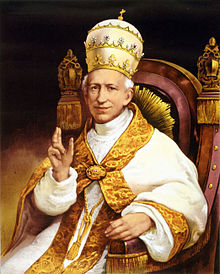|
Humanum genus
 Humanum genus is a papal encyclical promulgated on 20 April 1884 by Pope Leo XIII. Released in the ascent of the industrial age, Marxism, and the aftermath of the September 20, 1870, Capture of Rome by the Kingdom of Italy military forces from the Papal States, Humanum genus is principally a condemnation of Freemasonry. It states that the late 19th century was a dangerous era for the Roman Catholic Church, largely due to numerous concepts and practices it attributes to Freemasonry, namely naturalism, popular sovereignty, and the separation of church and state. Some of the strictures found in Humanum genus still remain in force today.[citation needed] Historical circumstancesFollowing the French withdrawal of its military garrison in Rome in the anticipation of the Franco-Prussian War, the 1870 Capture of Rome itself was a major battle within the long process of Italian unification known as the Risorgimento,[1] marking the final military defeat of the Papal States under Pope Pius IX by the Kingdom of Italy. This unification of the Italian peninsula by King Victor Emmanuel II of the House of Savoy ended the approximate 1,116 year temporal reign (AD 754 to 1870) of the Papal States by the papacy.[2] Humanum genus asserted that the late 19th century was a time of particular danger for Roman Catholics as the "partisans of evil" were now far less secretive, as evidenced by the new openness of Freemasonry.[citation needed] Freemasonry had been condemned by previous popes as being contrary to Catholic doctrine, but according to Humanum genus, the nature of Freemasonry was changing as Freemasons were far more open in society with their practices and affiliations.[citation needed] Humanum genus specifically condemned certain practices of the Freemasons, including: religious indifference;[3] the promotion of public education that denied the Church's role and where "the education of youth shall be exclusively in the hands of laymen";[4] the approval of the notion that the people are the only source of sovereignty, and that those who rule have no authority but by the commission and concession of the people.[not specific enough to verify] The Holy See has forbidden Roman Catholics from becoming Freemasons since 1738 with the issuing of the Pope Clement XII's bull In eminenti apostolatus.[citation needed] According to the 1983 Declaration on Masonic Associations, "the Church’s negative judgment in regard to Masonic association remains unchanged".[5] BackgroundSeveral popes before Leo XIII had addressed the problems that they associated with Freemasonry and said that the principles of that secret society were incompatible with the teachings of the Church. Previous papal pronouncements on Freemasonry include:
Leo XIII's denunciation of Freemasonry in Humanum genus can be seen as a call for Roman Catholics to oppose it, especially in the context of his examination of socialism (Quod apostolici muneris), his defence of Christian marriage (Arcanum), and his ideas about the role of government (Diuturnum). Because of the secrecy in Freemasonry, it was believed by the Holy See to have enormous disciplinary control over its members, which Leo viewed as enslavement.[6] By this definition, although individual Masons may be decent people, those same individuals would be led to commit evil acts through their participation in Freemasonry. Two kingdoms, two citiesHumanum genus leads with the presentation of the Augustinian dichotomy of the two cities, the City of Man and the City of God. The human race is presented as "separated into two diverse and opposite parts, of which the one steadfastly contends for truth and virtue, the other of those things which are contrary to virtue and to truth. The one is the kingdom of God on earth, namely, the true Church of Jesus Christ... The other is the kingdom of Satan,"[6] which was "led on or assisted" by Freemasonry:
Humanum genus depicted the fundamental doctrine of Freemasonry as naturalism, asserting that this leads to deism and Gnosticism.[citation needed] This was seen as driving Freemasons headlong toward a fundamental clash with the teachings of the Church, especially in light of Freemasons' support of separation of church and state by their efforts to enact and enforce civil constitutional obstacles to the establishment of state churches. It contrasted the idea of Original Sin in Catholic teaching to freemasonry and naturalism liberal approach:
Freemasonry condemned Humanum genus criticizes a number of other Masonic principles; for example, the idea that popular sovereignty is the source of all rights and that man should bend to no authority other than himself:
Canon 2335 of the Code of Canon Law (1917) declares that "Those who join a Masonic sect or other societies of the same sort, which plot against the Church or against legitimate civil authority, incur ipso facto an excommunication simply reserved to the Holy See."[10] The Code of Canon Law was updated in 1983, removing the earlier explicit condemnation and excommunication with the current Canon 1374, which states: "A person who joins an association which plots against the Church is to be punished with a just penalty; one who promotes or takes office in such an association is to be punished with an interdict."[11]  Cardinal Joseph Ratzinger, the Prefect of the Congregation for the Doctrine of the Faith under Pope John Paul II and himself elected as Pope Benedict XVI on 19 April 2005, issued the 26 November 1983 Declaration on Masonic Associations,[12] which in part states:
Finally, Humanum genus condemns what it presents as the Masonic idea of the separation of religion and state:
See also
References
External links
|
||||||||||||
Portal di Ensiklopedia Dunia
